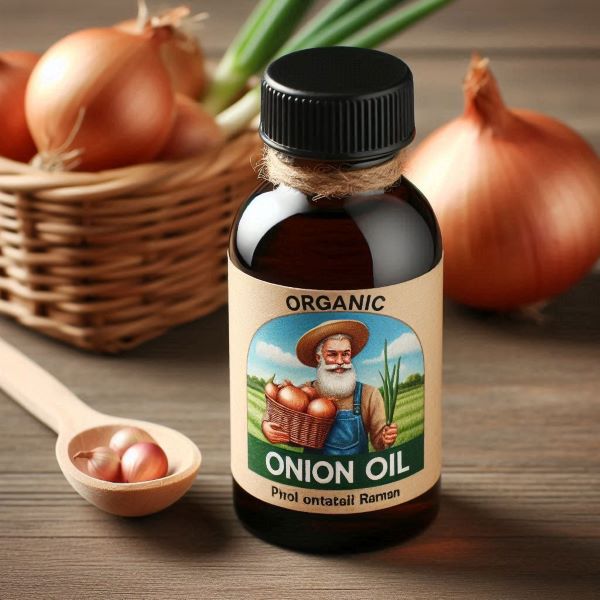Onion oil, derived from the bulbs of the Allium cepa plant, is a potent oil that has garnered attention for its numerous health and beauty benefits, particularly in hair care. Known for its rich sulfur content and other beneficial compounds, onion oil has been used traditionally in various cultures to promote hair growth, treat scalp infections, and improve overall hair health. This article explores the nutritional profile, benefits, uses, therapeutic advantages, properties, side effects, interesting facts, and scientific evidence related to onion oil.
Nutritional Profile of Onion Oil
It is rich in several key compounds that contribute to its health benefits:
- Sulfur Compounds: Including thio sulfinates, sulfoxides, and polysulfides, which are known for their antibacterial and antifungal properties.
- Vitamins: Particularly vitamins B6 and C.
- Minerals: Including potassium, calcium, and magnesium.
- Antioxidants: Such as quercetin and other flavonoids.
- Phytochemicals: Including saponins and phenolic acids.
Benefits of Onion Oil
1. Hair Care
- Promotes Hair Growth: Stimulates the scalp and improves blood circulation, which can lead to increased hair growth.
- Prevents Hair Thinning and Breakage: Strengthens hair follicles and prevents hair loss.
- Treats Dandruff and Scalp Infections: Its antibacterial and antifungal properties help keep the scalp healthy.
- Improves Hair Texture: Adds shine and softness to the hair.
2. Skin Care
- Anti-aging: Rich in antioxidants, it helps reduce signs of aging.
- Anti-Inflammatory: Can soothe irritated skin and reduce inflammation.
- Antimicrobial: Helps in treating acne and other skin infections.
3. General Health
- Boosts Immunity: The antioxidants and vitamins can help strengthen the immune system.
- Improves Circulation: Sulfur compounds enhance blood circulation.
Uses of Onion Oil
Hair Care
- Hair Growth Treatments: Applied directly to the scalp to promote hair growth.
- Shampoo and Conditioners: Added to hair care products for enhanced benefits.
- Hair Masks: Mixed with other oils and ingredients for intensive hair treatments.
Skin Care
- Anti-aging Creams: Included in skincare products to leverage its antioxidant properties.
- Acne Treatments: Used in formulations aimed at reducing acne and skin infections.
Aromatherapy
- Stress Relief: Though less common, the potent smell can be diluted and used for relaxation and stress relief.
Therapeutic Advantages
It offers several therapeutic benefits:
- Antimicrobial: Effectively combats bacteria and fungi.
- Anti-Inflammatory: Reduces inflammation in both skin and scalp conditions.
- Antioxidant: Protects against oxidative stress and free radical damage.
- Nutrient-rich: Provides essential vitamins and minerals for overall health.
Properties of Onion Oil
- Antibacterial: Inhibits the growth of bacteria.
- Antifungal: Prevents and treats fungal infections.
- Anti-Inflammatory: Reduces inflammation and soothes the skin.
- Antioxidant: Protects cells from oxidative damage.
- Circulation Booster: Enhances blood flow to the scalp and skin.
Also, read: All You Need to Know about Jasmine Oil Now
Side Effects
While it is generally safe when used properly, some individuals may experience:
- Skin Irritation: This can cause irritation or allergic reactions, particularly if not diluted properly.
- Strong Odor: Its potent smell can be off-putting to some users.
- Photosensitivity: May increase sensitivity to sunlight; users should apply sunscreen when using it on exposed skin.
- Pregnancy: Pregnant women should consult a healthcare provider before using onion oil.
Interesting Facts
- Historical Use: It has been used for centuries in traditional medicine for its healing properties.
- Extraction: Producing onion oil involves steam distillation of onion bulbs.
- Versatility: It can be used alone or combined with other oils for enhanced benefits.
- Sulfur Content: The high sulfur content is key to its effectiveness in promoting hair growth and health.
Scientific Evidence
Numerous studies support the health benefits of onion oil:
- Hair Growth: A study published in the Journal of Dermatology found that applying onion juice to the scalp significantly increased hair regrowth in patients with alopecia areata. (Source)
- Antibacterial and Antifungal Properties: Research published in the Journal of Antimicrobial Chemotherapy confirmed the efficacy of sulfur compounds in onion oil against a range of bacterial and fungal infections. (Source)
- Antioxidant Benefits: A study in the Journal of Agricultural and Food Chemistry highlighted the antioxidant properties of quercetin found in onions, which help protect against cell damage. (Source)
Conclusion
Onion oil is a powerful natural remedy with a rich history and a wide range of benefits. Its uses span from hair care and skincare to overall health improvement. While it is generally safe when used properly, it is essential to be aware of potential side effects and use it with caution. Supported by scientific evidence, onion oil continues to be a valuable addition to natural health and beauty routines, offering a blend of therapeutic and aromatic benefits that enhance overall well-being.





